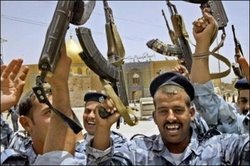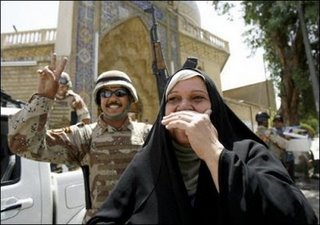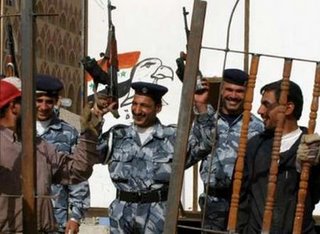I'm going to post these thoughts in three parts rather than one enormously long entry. This first post will explain why we shouldn't
overstate the importance of his death, the second will explain why we shouldn't
understate its importance, and the third will essentially argue that no matter what else, we should be happy that evil son of a bitch is gone.
In his remarks on Thursday, President Bush noted, "Zarqawi is dead, but the difficult and necessary mission in Iraq continues. We can expect the terrorists and insurgents to carry on without him. We can expect the sectarian violence to continue." Other administration officials, including Ambassador Khalilzad, have also tried to temper expectations of what Zarqawi's death means to our effort in Iraq.
I will leave it to the other commentators that have likely flooded the airwaves and op-ed pages back home to parse Zarqawi's precise role in the insurgency, and how his departure will alter Iraq's strategic landscape. In my present position, it is best if I don't say much on this topic.
Instead, I'd like to offer a bit of historical perspective regarding the effectiveness of strategic campaigns to kill or capture individuals. By strategic campaign, I mean a series of linked operations with the objective of removing an individual from a position of power, as opposed to a discrete operation such as those that killed Admiral Yamamoto in WWII, or the 1986 bombing of Tripoli that targeted Qaddafi. Yamamoto was a target of opportunity, and since there was no follow up to the 1986 attack on Libya, that operation does not meet the technical criteria to be called a campaign.
Instead, by my count, there have been roughly 9-10 strategic campaigns against foreign individuals/leaders in American military history: Emilio Aguinaldo (Philippines, roughly 1899-1901 ), Pancho Villa (Mexico, 1916), some Haitian rebels whose names I forget (during the 1915-1934 occupation), Augusto Sandino (Nicaragua, 1930s), Manuel Noriega (Panama, 1989), Pablo Escobar (Colombia, late 80s-1992, although since this was an entirely covert operation it may not count), Farah Aideed (Somalia, 1993), Osama Bin Laden (Afghanistan, 2001-present), Saddam Hussein (Iraq, 2003), and Zarqawi (Iraq, 2004-2006). Briefly looking at whether we got our target, and whether that led to the completion of the strategic goal that initiated the campaign, we find the following:
Aguinaldo -- Captured, but by the time of his capture he had been marginalized within the Philippine insurrection, and the worst massacres of U.S. forces of that war occurred after his capture.
Pancho Villa -- Never Captured, but banditry and attacks across our Southern border were never again a threat to U.S. security.
Haitian leaders -- Both Killed, Haiti eventually stabilized, albeit into a dirt poor nation.
Sandino -- Never Captured, but the U.S. was able to install a benign (to our interests at any rate) government that held power for over 40 years.
Noriega -- Captured, Panama no longer a strategic threat to U.S. interests.
Escobar -- Killed, but drug trafficking emanating from Colombia not significantly curtailed.
Aideed -- Never Captured, no stability brought to Somalia, which unfortunately has emerged as a greater threat to U.S. interests since our retreat in 1993 than it was at the time of the 1992 intervention.
Bin Laden -- Not Captured Yet, but arguably, the cells of Al Qaeda over which he had direct control in 2001 may have been marginalized by their expulsion from Afghanistan to the point that they don't pose nearly the threat they did on September 12, 2001. (This is a highly conditional assessment of course, and decentralized Bin Laden-inspired jihadists may pose an equal or greater threat than the Afghan-based network).
Saddam -- Captured, his capture had almost no effect on the insurgency in Iraq.
Zarqawi -- Killed, remains to be seen.
So of the nine cases that we can assess, only in three instances (Haiti, Noriega, and Aideed) did the capture or death of our target correlate to the achievement of our broader strategic objective. In the cases of Aguinaldo and Saddam Hussein, the worst violence of the conflict occurred after their capture. And of course, we could capture OBL tomorrow, which would change how that case is coded.
This is not to say we should not make individual leaders the target of military campaigns. Often the vigilant pursuit of an individual will prevent them from gathering the resources necessary to threat the United States or its allies (as was the case with Pancho Villa, Sandino, and possibly Bin Laden). This pursuit also may marginalize key leaders (Aguinaldo and Saddam} so that they become peripheral to the conflict's center of gravity, which significantly alters how those cases would be coded.
All of this is a rather academic and obtuse way of saying that history suggests that killing Zarqawi will likely in and of itself not be enough to end the insurgency in Iraq, and that President Bush is correct to try to manage expectations while celebrating Zarqawi's demise.







